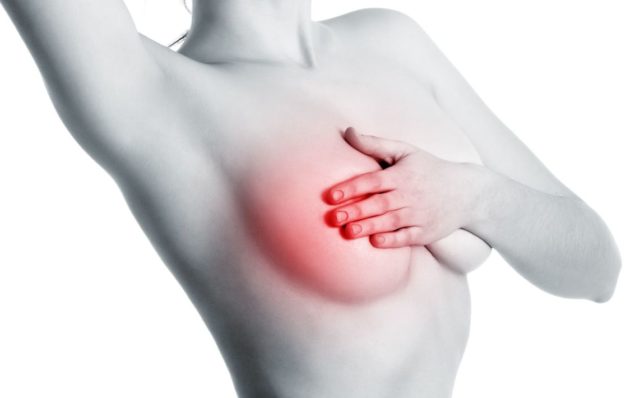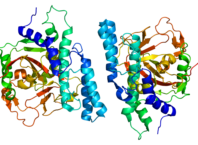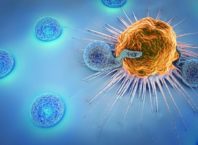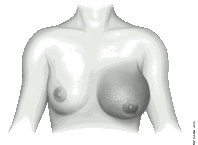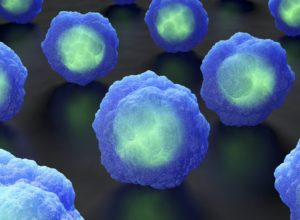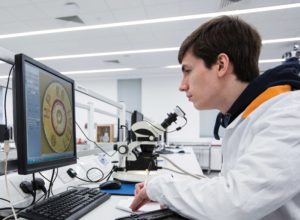Трудно поверить в то, что рак молочной железы может манифестировать без ощущения опухоли в груди. Тем не менее одна из редких форм заболевания, называемая воспалительным раком или маститоподобный, редко проявляется классической симптоматикой — чётко определяемой опухоли в ткани молочной железы. Воспалительный рак молочной железы (ВРМЖ) с его спецификой роста, когда основная масса опухолевых клеток распространяется по лимфатической системе подкожной клетчатки, очень похож на мастит. Маститоподобная клиника вводит в заблуждение врачей, что приводит к отсрочке постановки правильного диагноза.
Самообследование молочной железы и маммография практически не имеет ценности при диагностике ВРМЖ. Очень часто при обращении женщины с признаками заболевания ставится диагноз инфекционного воспаления груди, после чего приступают к лечению «очевидного» мастита. К сожалению, так как этот тип рака один из самых быстрорастущим, к тому времени, когда устанавливают правильный диагноз, болезнь обычно достигает своих «более поздних стадий».
What are the Signs and Symptoms of Inflammatory Breast Cancer?
Some of the first signs of inflammatory breast cancer often include red, swollen, itchy, or otherwise irritated breasts. Other signs and symptoms of IBC include:
- A sudden increase in breast size; usually one breast becomes noticeably larger than the other.
- Sudden warmth or heat that is felt upon touching the affected breast.
- Constant itching or pain in the breast.
- Nipple changes such as suddenly inverted or flattened nipples or discharge from the nipples.
- Changes in the skin of the affected breast such as thickening or ridging that may include dimpling that is textured and looks like an orange peel; this is called peau d’orange.
- A change in the color of the areola; the areola is the dark area of skin that surrounds the nipple.
- One or more bruises on one or both breasts.
- Swollen lymph nodes under the arm or on the neck.
Who is At Risk for Developing Inflammatory Breast Cancer?
An estimated one to six percent of new breast cancer cases are inflammatory breast cancer. African American women are slightly more likely than Caucasian women to have IBC. In fact, up to ten percent of all cases of new breast cancerin African American women are inflammatory breast cancer while, only six percent of new breast cancers in Caucasian women are IBC, and about five percent of new breast cancers in women of all other races are of this type.Inflammatory breast cancer occurs more often in much younger women than more common forms of breast cancer. Pregnant or breastfeeding women are not immune to IBC and the disease is often seen in this group of women. Men also can have inflammatory breast cancer, as well as other types of breast cancer. Breast cancer, including IBC, is seen in men an estimated 1,600 times annually in the U.S.
What are the Treatments for Inflammatory Breast Cancer?
The basic treatment plan for IBC is first several rounds of systemic treatments such as chemotherapy, hormone therapy, or both. Systemic treatments work by treating the whole body and killing cancer cells that have metastasized. Next radiation therapy, surgery, or both follow chemotherapy to shrink or rid the breasts of any remaining cancer cells that systemic therapy left intact in the breast or underarm area. Following radiation or surgery, IBC patients often receive another round of systemic treatments such as chemotherapy, hormone therapy, or biological therapy.
Is IBC an Automatic Death Sentence?
Absolutely not! There’s always hope and advancements in the treatment of inflammatory breast cancer have increased the five-year survival rate for patients to about fifty percent and the ten-year survival rate of approximately thirty-five percent. Like many types of cancer, as well as other diseases, having a strong and positive attitude can do a great deal of good towards increasing survivability.Early diagnosis and treatment save lives. See your healthcare provider immediately if you experience any of the signs or symptoms of inflammatory breast cancer. If you’re prescribed antibiotics and you haven’t improved significantly in one week, don’t be afraid to insist on a biopsy to determine whether you have any cancer cells. Always remember that you have the right to seek a second, third, or any number of opinions if you’re not comfortable with your doctor’s diagnosis or advice.
